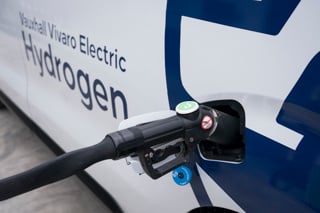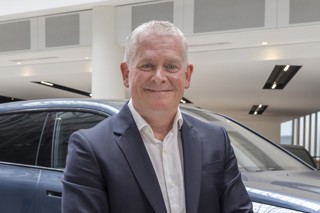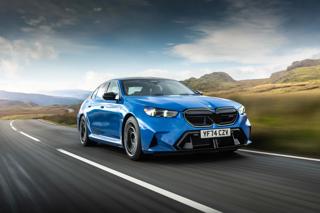A fierce battle is brewing for the future of road travel as major players bid to capitalise on the development of connected and autonomous cars.
Fleets could look dramatically different in a dozen years’ time as technology companies put traditional car manufacturers to the sword.
Enormous investment by tech giants, such as Google-owned Waymo, is giving them the edge in the race to autonomous driving, according to some experts.
Moreover, the tech firms have a clearer business case for profiting from driverless cars, monetising the time that passengers will spend in autonomous vehicles.
Stan Boland, chief executive officer of Five AI, says: “It’s far from clear that the traditional OEMs that have dominated the industry over the last 100 years will win as this industry rotates towards autonomy.
"You can almost say it’s certain they won’t win, and that the winning companies will be technology companies that can attract the talent and can adopt a model which upturns the existing model.”
The crisis for today’s vehicle manufacturers lies in a business model based on one-driver-one-car, when autonomy is forecast to lead to much greater sharing of vehicles, particularly in urban areas, although no one seems to be asking whether this is something people actually want.
“There is no history where a major industry has gone through a major transition like the one we are about to see and the incumbent in phase one has become the dominant player in phase two,” says Boland. “And it’s not going to happen here.”
He forecasts that vehicle manufacturers will not disappear, but will have to forge complex supply agreements with tech companies.
BMW and Intel, for example, are working together on an AV platform, and a new report from UBS forecasts that five different types of player – ‘Big Data, auto OEMs, ride-on-demand platforms, tech hardware players and auto suppliers’ – are in the race to develop a winning business model in a world of autonomous vehicles.
However, UBS also sees vehicle production remaining the domain of carmakers, after Waymo stopped producing its own cars in favour of adapting the Chrysler Pacifica and Jaguar i-Pace.
“Returns in AV production are too low for tech companies, entry barriers should not be underestimated, and the value-add for an AV happens elsewhere,” says UBS.
Among manufacturers, UBS expects that only a few premium brands and the very largest, low cost vehicle makers (capable of making huge volumes of budget robo-taxis) will benefit from the advent of autonomy.
The likelihood is that premium sector customers will be more inclined to keep a privately owned vehicle, because the cost per mile argument is less relevant for them, and UBS currently sees Daimler as best placed.
Christoph Domke, a director in KPMG’s Global Strategy Group, says: “There is generally an assumption in the industry that the hardware component – the vehicle itself – is getting less important.
"What becomes much more attractive, and where the value lies, is all the software and the services around it. It probably explains why Apple, Google and Amazon, which have the money to buy any OEM, haven’t done so.
"They know the actual vehicle is not the solution, it’s the software and the services around it.”
Manufacturers, however, are not going to cede their century-long domination of personal transport without a serious fight.
“As pioneers in automotive engineering, we will not leave the task of shaping future urban mobility to others,” says Dieter Zetsche, head of Mercedes-Benz Cars.
“At Daimler, we are vigorously and systematically pursuing our transformation from automobile manufacturer to provider of mobility services with our CASE strategy. CASE stands for connectivity, automated driving, sharing and services and electric mobility.”
Zetsche identified the world’s rapidly growing urban areas as the battleground for the future of mobility. These population-dense places need clean, seamlessly integrated transport.
Importantly, many manufacturers neither see the car as the sole solution to urban travel, nor see themselves as sole providers.
In one of the most interesting alliances, fierce rivals BMW Group and Daimler AG have announced plans (awaiting approval by competition authorities) to merge their mobility solutions into a 50:50 partnership, which will offer car sharing, ride hailing, parking, electric vehicle charging and multi-modal travel.
“The key to more liveable cities is in intelligent and seamless services that are easy to use and combine sustainable modes of transport and mobility services,” says Peter Schwarzenbauer, member of the Board of Management of BMW AG.
The combined technological and commercial might of the two German manufacturers creates a formidable competitor in the mobility market, and one capable of working with city authorities to develop transport plans for the future.
Harald Krüger, chairman of the Board of Management of BMW, says: “More than 23 million customers used our mobility services last year.
"By 2025, we will expand this base to 100 million active users, offering customers an all-round, all-inclusive package.
"The European Commission has calculated that private households in the EU invest more than a billion euros in mobility every year. In Germany alone, mobility needs will increase significantly by 2040, most of that still relying on cars.”
Krüger adds that the car remains the number one mode of transport, and that the development of mobility services will go hand-in-hand with a model offensive.
Indeed, a number of manufacturers argue that in the short term, car sharing services in particular will play a powerful role in introducing drivers to electric cars and overcoming their fears of the unknown.
“We are already anticipating what mobility will look like in 10, 15 years down the road – and taking the necessary decisions today,” says Krüger.
Rival manufacturer Volvo has branded the future M, with the Swedish car maker insisting it is “becoming more than just a car company,” according to Håkan Samuelsson, Volvo Cars president and chief executive.
M aims to provide a better alternative to car ownership for metropolitan customers, offering reliable, on-demand access to cars and services, summoned through a self-learning app that questions users about their individual travel needs, rather than simply telling them where they can collect a car. Volvo will launch M trials in Stockholm, Sweden, this autumn and plans to launch in the US in the spring of 2019.
“We recognise that urban consumers are rethinking traditional car ownership,” says Samuelsson. “We are evolving to become a direct-to-consumer services provider under our new mission ‘Freedom to Move’.”
Cars remain central to M, but Volvo promises to deliver more to the travel experience than ride hailed taxis and public transport. Its goal is to provide a genuine alternative to the way current drivers actually use their cars.
Unsurprisingly for a premium brand, Volvo is focused on offering a ‘premium experience’ in the mobility market – one that makes life easy and which saves precious time.
“Mobility is undergoing a fundamental transformation. The launch of M creates new sources of revenue for Volvo Cars and will be integral to the company’s ambition to build more than five million direct consumer relationships by the middle of the next decade,” says Samuelsson.
When Bodil Eriksson took up her role as chief executive officer of Volvo Car Mobility, she relinquished her car keys and determined to rely on alternative mobility solutions, describing the experience as both frustrating and liberating.
“One of the first insights, from not having a car of your own, is that the car itself becomes secondary. What is important is what you are about to do: to solve, to fix, to explore. Mobility is an enabler for the lives we want to live,” she says.
The concept of mobility is extending the parameters of what constitutes transport – Volkswagen, for example, has unveiled ‘micro-mobility’ solutions that are far closer to electric scooters than any four-wheeled car – and is fundamentally changing the way manufacturers view themselves.
Two years ago, Volkswagen set up the company MOIA to redefine ‘mobility for people living in urban areas’.
Based in Berlin, Hamburg and Helsinki, MOIA “does not see itself as an automaker or a pure-play car-sharing provider, but rather aims to become one of the world’s leading mobility service providers by 2025,” says the company.
Showing it can be every bit as ambitious as the all-conquering tech firms are in their own markets, MOIA will develop on-demand ride-hailing and ride-pooling services in-house, while simultaneously investing in digital start-ups and collaborating with cities and established transport providers.
Volkswagen plans to roll out on-demand car sharing services in its domestic market next year, and in major cities across Europe, North America and Asia from 2020.
“We are convinced that the car sharing market still has potential,” says Jürgen Stackmann, Volkswagen Brand board member for sales.
“That is why we are entering this market with a holistic single-source concept covering all mobility needs from the short journey that takes just a few minutes to the long vacation trip.
"Our vehicle-on-demand fleets will consist entirely of electric cars, and will therefore provide zero-emission, sustainable mobility. That is an intelligent way to relieve the strain on urban areas.”
A year ago, McKinsey & Co forecast that the sharing of cars would lead to a slower growth of vehicle sales, but suggested that it would also present new revenue opportunities for manufacturers and mobility players.
This new income stream will have to be considerable to compensate for an anticipated fall in vehicle sales by 2030.
On the plus side, shared vehicles will have higher utilisation rates and therefore require replacing more frequently.
They may also be cheaper to manufacture, if carmakers no longer have to woo individual drivers, paving the way for less powerful engines, simpler interiors, more basic assembly processes and, of course, lower distribution costs.
McKinsey indicated that this type of car could cost up to a quarter less than a standard car.
As for making money, McKinsey suggested that manufacturers might morph into fleet operators, building relationships with major cities to be part of the solution for urban transport requirements.
Furthermore, market forecasts for the revenue potential from connected cars helps to explain the current land grab between tech firms and manufacturers.
An academic paper published in April by Accenture Digital and the German Association for the Digital Economy, projected that by 2050 OEMs will generate half of their revenue from data-driven services.
The study sees manufacturers as holding the upper hand in the battleground for data-driven business services, so long as they can adapt swiftly enough, arguing that tech players will not be able to attack the automotive industry in the same way as they have besieged other industries.
Moreover, the transition from theory to practical implementation of autonomous, connected and shared cars is taking place more gradually than anticipated, giving manufacturers time to build their capabilities, said the study.
“The new digital services will be asset-based, requiring engineering capabilities and brand assets,” it says.
“To survive and thrive in this scenario, OEMs will have to become complete digital protagonists, said the report, capitalising on their own brand reputations and enforcing cooperation with other players.
“Car makers should not seek to copy Uber or Google. On the contrary. In the cyber-physical world of the Internet of Things, physical strikes back.
"Whoever controls the complete chain – hardware, data, insights and digital services – can deliver the most superior brand experience,” it concludes.



















Login to comment
Comments
No comments have been made yet.